2022 Intersectional Justice Discussion Group Instructors
Marcus Anthony Brock 
Marcus Anthony Brock is a writer, a teacher, a researcher, and a purveyor of culture, drawing critical segues among race, identity, art, and our evolving humanity through storytelling—griot-descended from Laurel, Mississippi—a keeper of things—a Native Son—and a dreamer from Compton, California. Currently he is an adjunct professor of cultural studies at the Fashion Institute of Technology and Marymount Manhattan College where he teaches African American literature, LGBTQ+ literature, media studies, the “DJ” as a healer, love as a gift and a thief, and the significance of subculture. In addition, he is a W. Burghardt Turner Fellow and doctoral candidate at Stony Brook University in the Department of Cultural Studies & Comparative Literature. He holds a B.A. in American literature and culture from University of California, Los Angeles (UCLA) and a Master of Communication Management from the University of Southern California’s Annenberg School for Communication and Journalism. His writing has appeared in The Tenth magazine and on Ebony.com, Quartz, Afropunk, and the Medium publication, P.S. I Love You. His book project, Sensational Oppression: Revolutionary Aspirations for Black Bodies, Queer Kinship, and Resistance in Visual Culture is forthcoming.
E. Barnick 
E. Barnick is a Ph.D. candidate in performance studies at New York University studying the intersection of image making, carceral epistemologies, and collective creative practice. Their research focuses on imaging as a site of rehearsal for sense making in community, and as a practice of community that de/recomposes relationships to harm. They received their B.A. in theater and performance studies from Stanford University and they have worked for several years as a performance facilitator and rehearsal enthusiast.
troizel carr 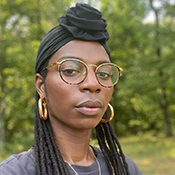
troizel carr is black + alive and the queerness of this fact means more than these words can express. A thinker + doer, she received her B.A. in theater studies and women's, gender, & sexuality studies from Emory University and a Master of Art and a Master of Philosophy in performance studies from New York University, where they are finishing their Ph.D. in performance studies. troizel is an alumnx of the Hemispheric Institute for Performance & Politics' Emerging Artists Program and the Studio Museum in Harlem's Museum Education Practicum. They currently serve as a teaching artist at New Museum of Contemporary Art in New York City, NY and Studio Resident at Gallery Aferro in Newark, NJ. Their art and writings have appeared in NPR, loose cornrows, Black Agenda Report, and Studio Magazine. Currently, they serve as managing editor of Women & Performance: a journal of feminist theory.
Mia Kang 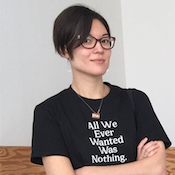
Mia Kang is a poet and art historian working across research, writing, and performance. She holds an M.A. in the history of art from Yale University, where she is completing her Ph.D. Her research focuses on the contested rise of U.S. multiculturalism and its unresolved legacies. Recent publications include contributions to Roxy Paine: The Dioramas (Skira, 2021), The Life and Times of Alvin Baltrop (Skira, 2019), Sanford Biggers: Codeswitch (Yale University Press, 2020), Published by Lugemik: Printed Matter from 2010-2019 (Lugemik, 2019), and Plot magazine. Formerly a Mellon Mays Undergraduate Fellow, she teaches as a lecturer at Yale College and Hunter College, CUNY, her alma mater.
Kang has also published widely as a poet. She is the author of the pamphlet City Poems (ignitionpress, 2020), and she was named the 2017 winner of Boston Review’s Annual Poetry Contest. Her poetry has appeared in journals including POETRY, Pleiades, Poetry Northwest, and PEN America. She has received awards from the Academy of American Poets, the Fine Arts Work Center in Provincetown, and the Millay Colony for the Arts. Her current poetics/performance project, “Theresa, I Miss You,” is dedicated to Ther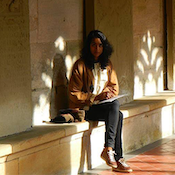 esa Hak Kyung Cha.
esa Hak Kyung Cha.
Tara Menon
Tara Menon focuses, in her research and teaching, on problems of religion, experience, and secularization in the European and Indian traditions. She has held fellowships at Jawaharlal Nehru University in New Delhi and the Ecole des Hautes Etudes en Sciences Sociales in Paris.
Iris Moon 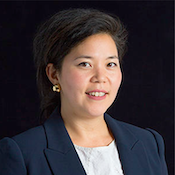
Iris Moon is an assistant curator of European ceramics and glass at the Metropolitan Museum of Art. Her research on the history and theory of European decorative arts and architecture has been supported by The Met, the Clark Art Institute, and the Getty Research Institute. Alongside curatorial work at The Met, where she recently participated in the reinstallation of the British Galleries, she teaches at The Cooper Union. She is co-editor with Richard Taws of Time, Media, and Visuality in Post-Revolutionary France (2021) and is the author of Percier and Fontaine and the Struggle for Sovereignty in Revolutionary France (2016). A new book, Luxury after the Terror, is forthcoming with Penn State Press. She earned her B.A. at Williams College and her Ph.D. at Massachusetts Institute of Technology.
Rose Ojo Ajayi 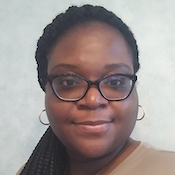
Rose Ojo-Ajayi is an artist, writer, educator, and historian whose work is primarily based in Comparative African Diaspora history, with a focus on the production of visual art created in African American, Black British, and West African societies. Her research is also centered on social movements during the 20th and 21st centuries that includes the Black Power/ Black Arts Movements in the United States and Britain as well as the Independence period of West African nations.
Ojo-Ajayi earned her Ph.D. from The School of Oriental and African Studies (SOAS), University of London in 2016. Her doctoral thesis is on migration and the assertion of African Diasporic identities in the work of artists of African descent based in the United States and Britain in the photographic work of Carrie Mae Weems, Joy Gregory, Albert Chong, Renee Cox, Rotimi Fani-Kayode, and Yinka Shonibare.
She has also written text-based works as a collaborative project with visual artists along with writing for publications such as the Studio Museum in Harlem’s STUDIO magazine, curating and co-curating exhibitions that feature the work of artists of African descent in New York City and London, UK. Currently she is investigating the representation of Black American and Black British identities in the contemporary work of first and second-generation African immigrant artists.
Harold Ramdass 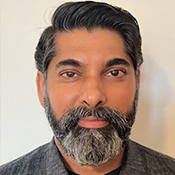
Harold N. Ramdass earned his B.A. from Baruch College, CUNY, and his Ph.D. from Princeton University. An Early Modern specialist by training, he has taught across various fields and has extensive writing center experience. At Cooper, he specializes in HSS 1, 2, & 4 and created courses on Caribbean societies and on the Fairy Tale. In Fall 2019, he and his class created the inaugural edition of Heads & Tales, an anthology of original student-created fairy tales and illustrations in print and digital formats.
Malcolm Rio 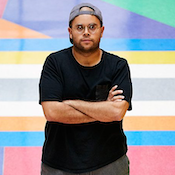
Malcolm Rio (he/they) is a Providence-based graphic and architectural designer and thinker. They are currently an assistant professor in the Department of Architecture at the Rhode Island School of Design (RISD) as well as a Ph.D. student at Columbia University in the Department of Architectural History and Theory. Their research focuses on the intersections of race, sexuality, and kinship in the 19th and 20th centuries. Rio holds a Master of Science in Architecture Studies (SMArchS) from Massachusetts Institute of Technology, where they were recognized with the 2019 SMArchS Thesis Prize and the Arthur Rotch Special Prize for research on the urbanism of house-ballroom culture in New York City titled, Drag Hinge: “Reading” the Scales between Architecture and Urbanism (2019). They also hold a Master of Architecture from RISD, and both a Bachelor of Science in Philosophy and a Bachelor of Fine Art in Art + Design from Towson University.
Ricardo Rivera 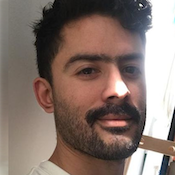
Ricardo Rivera is a Ph.D. student in anthropology at the University of California, Berkeley, and earned a B.A. and M.A. in linguistics at the University of Chicago. His dissertation, titled In the Aftermath of Empire: Memory, Time, and History in Adjara, Georgia, analyzes the forms that historical memory takes in everyday cultural practices in Adjara, an autonomous region of the Republic of Georgia. His research, funded by the National Science Foundation, focuses in particular on the legacy of this region’s history as a frontier province of the Ottoman Empire. His broader research and teaching interests focus on time and temporality, notions of historical rupture and continuity, and the construction of memory through language and narrative.




